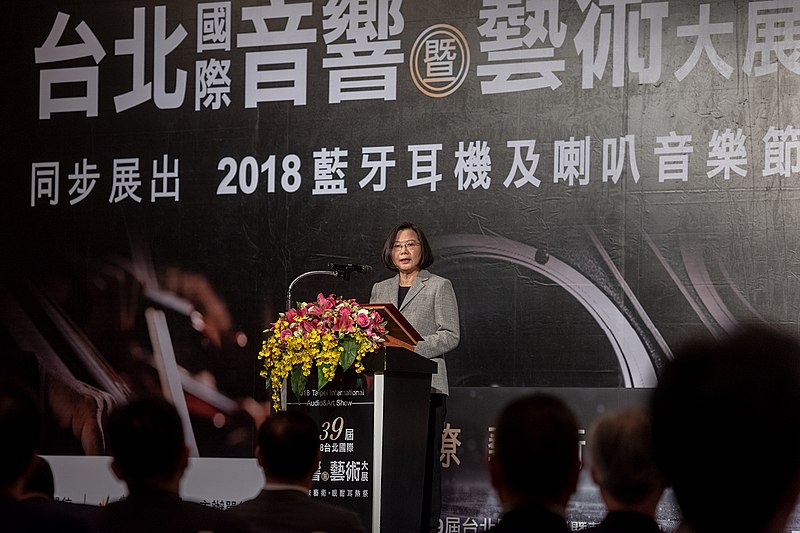Taiwanese President Tsai Ing-wen appointed a new intelligence chief as part of a broader reshuffling of the island’s government. The new appointment to the position also comes amidst growing tensions with China, which claims the democratically-governed island as its territory.
On Thursday, the Taiwanese presidential office announced that Tsai had appointed deputy foreign minister Tsai Ming-yen, who served as the island nation’s de facto ambassador to the European Union, to head the National Security Bureau. Tsai Ming-yen will be replacing Chen Ming-tong, who resigned, citing a desire to “rest.” Tsai Ming-yen previously served as an advisor to the Taiwanese defense ministry and the Mainland Affairs Council.
The two share the same family name but are not related.
The office said that Tsai hopes to rely on his expertise in regional security, foreign affairs, and international strategy to assist the national security team in “interpretation and precise decision-making” for the current situation with China and the region. The office added that Tsai hopes that he will “continue to promote the specialized tasks of the intelligence system, and continue to strengthen the governance and innovation of intelligence agencies in the era of democratization.”
Tsai Ming-yen’s appointment follows that of former Taiwanese vice president Chen Chien-jen as the island’s new premier, succeeding Su Tseng-chang on Wednesday. Tsai is set to formally unveil the new members of the cabinet on Friday during a news conference.
The new appointments follow the major losses suffered by the governing Democratic Progressive Party in the November elections.
China claims Taiwan as its territory and increased its military drills near the island in August last year. Taiwan has repeatedly rejected China’s claims over the island.
Earlier this week, Tsai assured Pope Francis that a military conflict with China was not an option. In a copy of her letter to the pontiff released by the presidential office on Monday, Tsai said that only by respecting Taiwan’s sovereignty and the freedom of its people can there be good relations between the island and Beijing.
The Vatican is one of the 14 nations that still maintain formal diplomatic ties with Taiwan.
Tsai said the war in Ukraine has made the world appreciate and value peace, and maintaining regional security was a global consensus.



 TrumpRx Website Launches to Offer Discounted Prescription Drugs for Cash-Paying Americans
TrumpRx Website Launches to Offer Discounted Prescription Drugs for Cash-Paying Americans  Missouri Judge Dismisses Lawsuit Challenging Starbucks’ Diversity and Inclusion Policies
Missouri Judge Dismisses Lawsuit Challenging Starbucks’ Diversity and Inclusion Policies  Federal Judge Restores Funding for Gateway Rail Tunnel Project
Federal Judge Restores Funding for Gateway Rail Tunnel Project  Jack Lang Resigns as Head of Arab World Institute Amid Epstein Controversy
Jack Lang Resigns as Head of Arab World Institute Amid Epstein Controversy  Pentagon Ends Military Education Programs With Harvard University
Pentagon Ends Military Education Programs With Harvard University  South Korea Assures U.S. on Trade Deal Commitments Amid Tariff Concerns
South Korea Assures U.S. on Trade Deal Commitments Amid Tariff Concerns  Netanyahu to Meet Trump in Washington as Iran Nuclear Talks Intensify
Netanyahu to Meet Trump in Washington as Iran Nuclear Talks Intensify  Iran–U.S. Nuclear Talks in Oman Face Major Hurdles Amid Rising Regional Tensions
Iran–U.S. Nuclear Talks in Oman Face Major Hurdles Amid Rising Regional Tensions  India–U.S. Interim Trade Pact Cuts Auto Tariffs but Leaves Tesla Out
India–U.S. Interim Trade Pact Cuts Auto Tariffs but Leaves Tesla Out  China Warns US Arms Sales to Taiwan Could Disrupt Trump’s Planned Visit
China Warns US Arms Sales to Taiwan Could Disrupt Trump’s Planned Visit  Trump’s Inflation Claims Clash With Voters’ Cost-of-Living Reality
Trump’s Inflation Claims Clash With Voters’ Cost-of-Living Reality  U.S.-India Trade Framework Signals Major Shift in Tariffs, Energy, and Supply Chains
U.S.-India Trade Framework Signals Major Shift in Tariffs, Energy, and Supply Chains  New York Legalizes Medical Aid in Dying for Terminally Ill Patients
New York Legalizes Medical Aid in Dying for Terminally Ill Patients  U.S. Announces Additional $6 Million in Humanitarian Aid to Cuba Amid Oil Sanctions and Fuel Shortages
U.S. Announces Additional $6 Million in Humanitarian Aid to Cuba Amid Oil Sanctions and Fuel Shortages  Trump Backs Nexstar–Tegna Merger Amid Shifting U.S. Media Landscape
Trump Backs Nexstar–Tegna Merger Amid Shifting U.S. Media Landscape  Trump Allows Commercial Fishing in Protected New England Waters
Trump Allows Commercial Fishing in Protected New England Waters 































